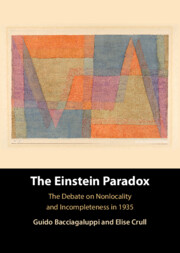Book contents
- Frontmatter
- Dedication
- Contents
- Preface
- Permissions and Copyright Notices
- Permissions and Copyright Notices
- Part I Main Contributions to the EPR Debate in 1935
- 1 Einstein on EPR
- 2 Others on EPR
- 3 Schrödinger on EPR
- 4 Heisenberg on EPR
- 5 Bohr on EPR
- Part II Selected Pre-EPR Papers
- 6 Knowledge of Past and Future in Quantum Mechanics
- 7 On the Indeterminacy Relation
- 8 Bohr.Einstein Example
- Part III Core EPR Papers
- 9 Can Quantum-Mechanical Description of Physical Reality be Considered Complete?
- 10 Discussion of Probability Relations Between Separated Systems
- 11 The Present Situation in Quantum Mechanics
- 12 Note on the Quantum-Mechanical Theory of Measurement
- 13 Remarks on Measurements in Quantum Theory
- 14 Is a Deterministic Completion of Quantum Mechanics Possible?
- 15 The Natural-Philosophical Foundations of Quantum Mechanics (Excerpt)
- 16 Can Quantum-Mechanical Description of Physical Reality be Considered Complete?
- Part IV Other Reactions to EPR
- 17 The Correlation of Wave Functions with the States of Physical Systems
- 18 States and Reality of Physical Systems
- 19 Quantum Mechanics as a Physical Theory
- 20 The Observation of Canonically Conjugates
- 21 Quantum Mechanics and Physical Reality
- 22 Is the Quantum-Mechanical Description of Physical Reality Complete?
- 23 Physical Reality and Quantum Mechanics
- 24 Quantum-Mechanical Description
- 25 Quantum Mechanics and Physical Reality
- Part V Correspondence
- 26 Correspondence on the ‘Einstein Paradox’
- Envoi
- References
- Index
3 - Schrödinger on EPR
Published online by Cambridge University Press: 14 November 2024
- Frontmatter
- Dedication
- Contents
- Preface
- Permissions and Copyright Notices
- Permissions and Copyright Notices
- Part I Main Contributions to the EPR Debate in 1935
- 1 Einstein on EPR
- 2 Others on EPR
- 3 Schrödinger on EPR
- 4 Heisenberg on EPR
- 5 Bohr on EPR
- Part II Selected Pre-EPR Papers
- 6 Knowledge of Past and Future in Quantum Mechanics
- 7 On the Indeterminacy Relation
- 8 Bohr.Einstein Example
- Part III Core EPR Papers
- 9 Can Quantum-Mechanical Description of Physical Reality be Considered Complete?
- 10 Discussion of Probability Relations Between Separated Systems
- 11 The Present Situation in Quantum Mechanics
- 12 Note on the Quantum-Mechanical Theory of Measurement
- 13 Remarks on Measurements in Quantum Theory
- 14 Is a Deterministic Completion of Quantum Mechanics Possible?
- 15 The Natural-Philosophical Foundations of Quantum Mechanics (Excerpt)
- 16 Can Quantum-Mechanical Description of Physical Reality be Considered Complete?
- Part IV Other Reactions to EPR
- 17 The Correlation of Wave Functions with the States of Physical Systems
- 18 States and Reality of Physical Systems
- 19 Quantum Mechanics as a Physical Theory
- 20 The Observation of Canonically Conjugates
- 21 Quantum Mechanics and Physical Reality
- 22 Is the Quantum-Mechanical Description of Physical Reality Complete?
- 23 Physical Reality and Quantum Mechanics
- 24 Quantum-Mechanical Description
- 25 Quantum Mechanics and Physical Reality
- Part V Correspondence
- 26 Correspondence on the ‘Einstein Paradox’
- Envoi
- References
- Index
Summary
Schrödinger’s reaction to the EPR paper is less widely known than, say, Bohr’s, and yet our analysis shows that it fits rather nicely with contemporary concerns in foundations of quantum mechanics. Taking the lead both from the EPR paper and from Pauli’s remarks in their correspondence, Schrödinger shows that EPR’s locality considerations lead to the assignment of values to all quantum mechanical observables, but that under apparently mild assumptions this then leads to contradictions of the von Neumann type. This dilemma (as he explicitly calls it) is thus similar to more recent debates between nonlocality on the one hand and no-go results on the other (whether through violation of the Bell inequalities, the Kochen–Specker theorem, or what you will). We shall first look at Schrödinger’s fundamental worries in the years leading up to 1935. The chapter then discusses in detail the direct reaction by Schrödinger to EPR. It will, however, not exhaust our discussion of Schrödinger, who is a recurring character in the book, having poked and prodded his peers on EPR during the whole summer and autumn of 1935.
Keywords
- Type
- Chapter
- Information
- The Einstein ParadoxThe Debate on Nonlocality and Incompleteness in 1935, pp. 52 - 94Publisher: Cambridge University PressPrint publication year: 2024

